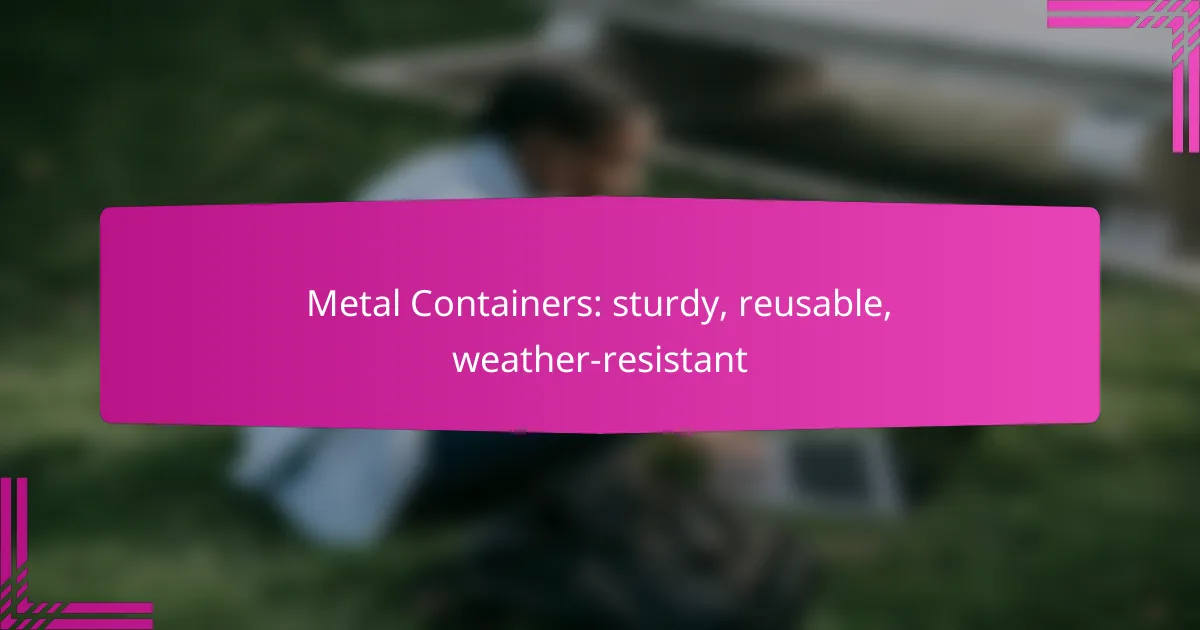Metal containers are an excellent choice for outdoor use, offering unmatched durability and weather resistance. Made from materials like stainless steel and aluminum, these sturdy options are reusable and designed to withstand harsh conditions. Their longevity not only makes them practical for storage and transportation but also provides significant environmental benefits compared to plastic alternatives.
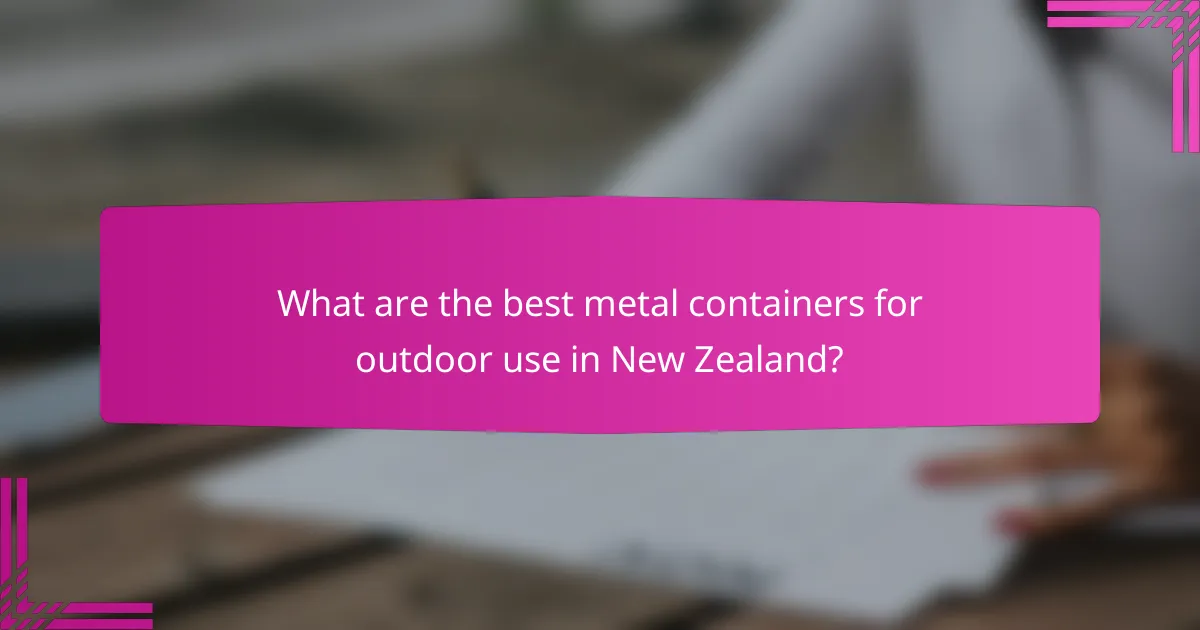
What are the best metal containers for outdoor use in New Zealand?
The best metal containers for outdoor use in New Zealand include stainless steel, aluminum, copper, galvanized steel, and weather-resistant metal boxes. These options provide durability, resistance to the elements, and reusability, making them ideal for various outdoor applications.
Stainless steel containers
Stainless steel containers are highly durable and resistant to rust, making them suitable for outdoor environments in New Zealand. They are often used for food storage, water collection, and general outdoor organization due to their strength and longevity.
When selecting stainless steel containers, look for those with a high nickel content for better corrosion resistance. Popular sizes range from small canisters to large bins, accommodating various storage needs.
Aluminum storage bins
Aluminum storage bins are lightweight and resistant to corrosion, making them a practical choice for outdoor use. They are often used for storing tools, equipment, or supplies, as their portability allows for easy transport.
Consider bins with a thicker gauge aluminum for added strength. Many aluminum bins come with secure lids to protect contents from rain and pests, enhancing their usability outdoors.
Copper canisters
Copper canisters are not only aesthetically pleasing but also provide excellent durability and resistance to the elements. They are often used for decorative storage or as planters in outdoor settings.
While copper canisters can develop a patina over time, this can be prevented with regular cleaning. Ensure that any canisters used for food storage are lined or treated to avoid reactions with acidic substances.
Galvanized steel drums
Galvanized steel drums are robust and weather-resistant, making them ideal for storing larger quantities of materials outdoors. They are commonly used for waste disposal, rainwater collection, or as storage for gardening supplies.
When using galvanized drums, check for proper sealing to prevent leaks. Sizes typically range from 50 to 200 liters, allowing for flexibility based on your storage requirements.
Weather-resistant metal boxes
Weather-resistant metal boxes are designed to withstand harsh outdoor conditions, making them perfect for storing tools, equipment, or sensitive materials. These boxes often feature seals to keep out moisture and pests.
Look for boxes with a powder-coated finish for added protection against rust and UV damage. Sizes can vary widely, so choose one that fits your specific storage needs while ensuring it can be securely locked if necessary.
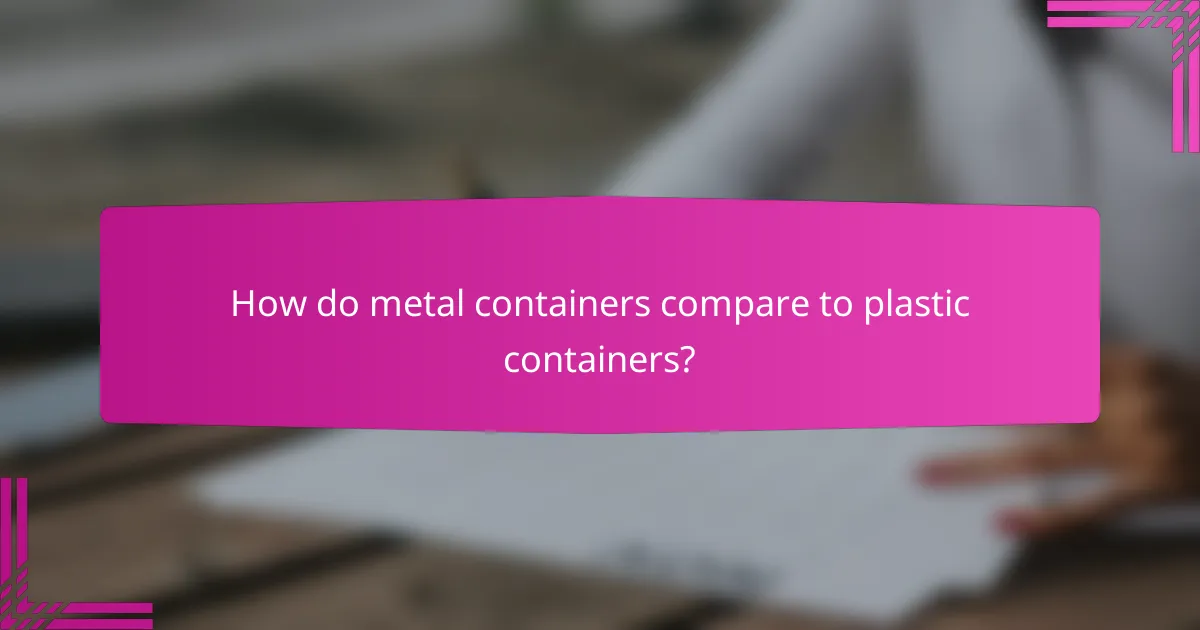
How do metal containers compare to plastic containers?
Metal containers are generally more durable, reusable, and weather-resistant than plastic containers. While both types serve similar purposes, metal containers often provide superior longevity and environmental benefits.
Durability and lifespan
Metal containers are known for their exceptional durability, often lasting many years without significant wear. Unlike plastic, which can degrade or become brittle over time, metal maintains its integrity under various conditions, including extreme temperatures and exposure to moisture.
For example, stainless steel containers can withstand heavy use in both indoor and outdoor settings, making them ideal for storage and transport. In contrast, plastic containers may need to be replaced every few years, depending on usage and environmental factors.
Environmental impact
Metal containers have a lower environmental impact compared to plastic containers, particularly when considering their recyclability. Most metals, such as aluminum and steel, can be recycled multiple times without losing quality, contributing to a circular economy.
Plastic, on the other hand, can take hundreds of years to decompose and is often not recycled effectively. Choosing metal over plastic helps reduce waste and supports sustainable practices, especially in regions with strict recycling regulations.
Cost-effectiveness
While the initial cost of metal containers may be higher than that of plastic containers, their longevity often makes them more cost-effective in the long run. Investing in durable metal options can save money over time, as they typically do not require frequent replacements.
For instance, a sturdy metal container may cost around 20-50% more upfront but can last several times longer than a plastic counterpart. This makes metal containers a wise choice for both personal and commercial use, especially for those looking to minimize ongoing expenses.
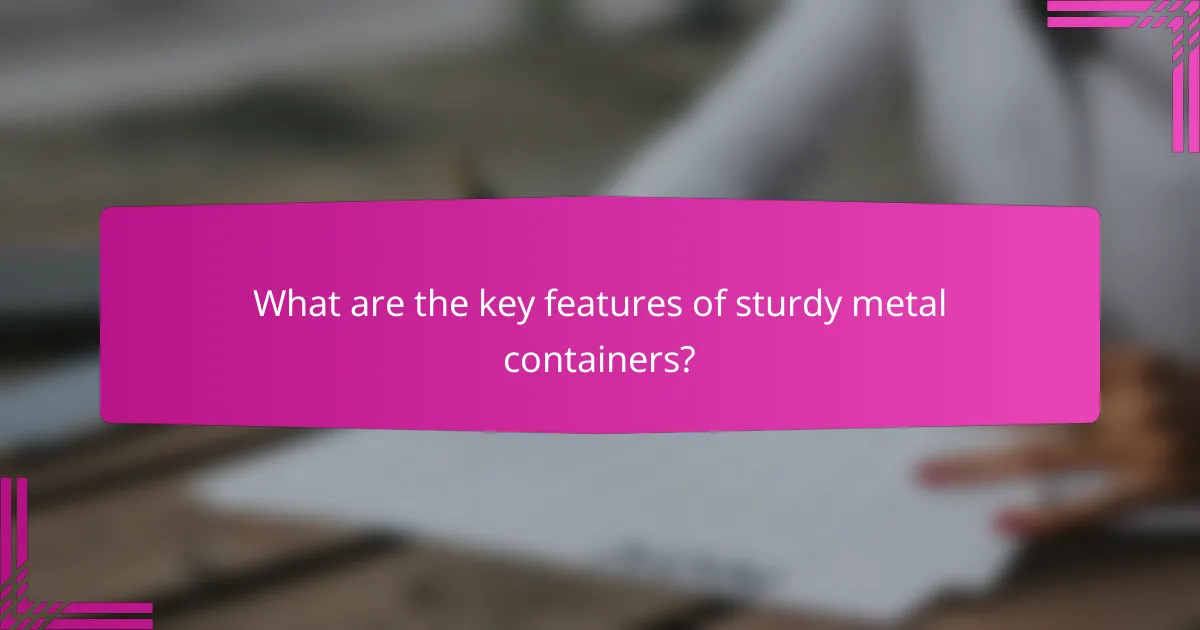
What are the key features of sturdy metal containers?
Sturdy metal containers are characterized by their durability, weather resistance, and reusability. These features make them ideal for various applications, from storage to transportation, ensuring they can withstand harsh conditions and repeated use.
Weather resistance
Weather resistance in metal containers means they can endure exposure to rain, snow, and extreme temperatures without deteriorating. This feature is crucial for outdoor storage or shipping, where environmental factors can cause damage to less resilient materials.
When selecting a metal container for outdoor use, consider options with protective coatings or finishes that enhance their weather resistance. For example, galvanized steel containers are often preferred for their ability to resist rust and corrosion in wet conditions.
Reusability
Reusability is a significant advantage of metal containers, allowing them to be used multiple times without losing structural integrity. This makes them a cost-effective choice for businesses that require durable storage solutions.
To maximize reusability, ensure proper cleaning and maintenance after each use. Avoid using harsh chemicals that could damage the container’s surface, and inspect for any signs of wear or damage before reuse.
Corrosion resistance
Corrosion resistance is vital for metal containers, especially when exposed to moisture or chemicals. Containers made from stainless steel or those with protective coatings can significantly extend their lifespan by preventing rust and degradation.
When choosing a metal container, look for materials that meet relevant standards for corrosion resistance, such as ASTM or ISO certifications. This ensures that the container will perform well in various environments, including industrial settings where exposure to corrosive substances is common.
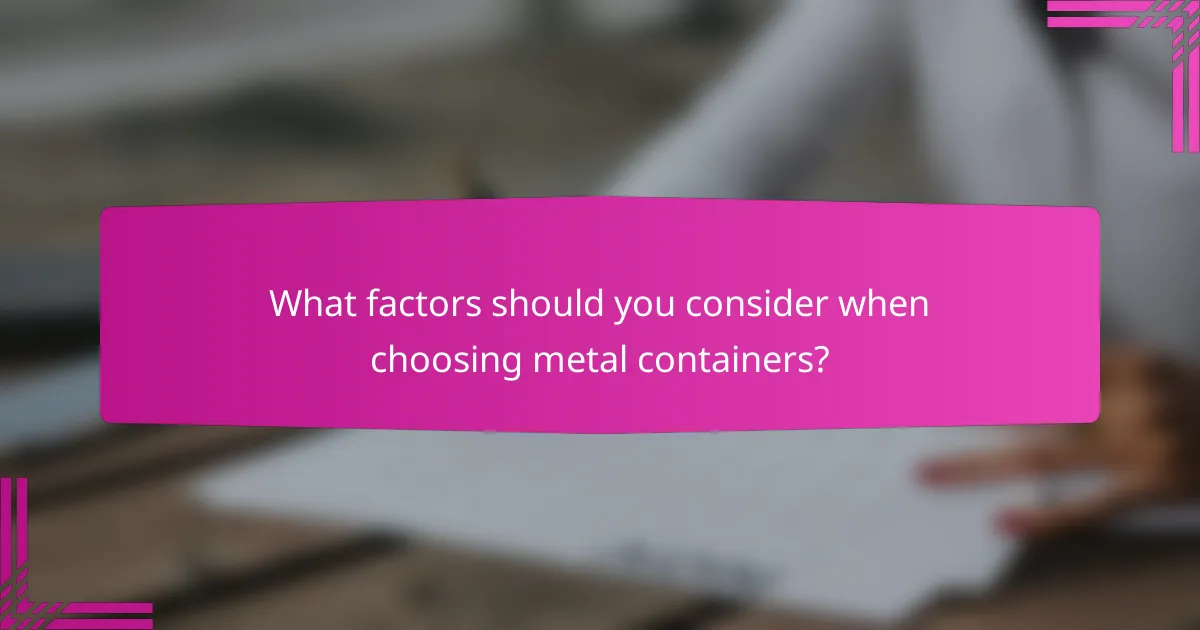
What factors should you consider when choosing metal containers?
When selecting metal containers, consider size and capacity, material type, and intended use. These factors will help ensure that the containers meet your specific needs and perform effectively in various conditions.
Size and capacity
The size and capacity of metal containers are crucial for their functionality. Choose a size that fits your storage or transport requirements, whether for small items or bulk materials. Common sizes range from a few liters to several hundred liters, so assess your needs carefully.
Additionally, consider how the container’s dimensions will affect its portability and storage. For instance, larger containers may be more challenging to move but can hold more items, while smaller ones are easier to handle but may require multiple trips.
Material type
Metal containers are typically made from materials like stainless steel, aluminum, or carbon steel, each offering different benefits. Stainless steel is highly resistant to corrosion and is ideal for food storage, while aluminum is lightweight and suitable for transport.
Carbon steel, on the other hand, is robust and often used for heavy-duty applications. Evaluate the environmental conditions the container will face, such as humidity or exposure to chemicals, to choose the most suitable material.
Intended use
Your intended use for the metal container will significantly influence your choice. For example, if you need a container for outdoor storage, ensure it is weather-resistant and can withstand varying temperatures. Containers designed for industrial use may require additional features like reinforced edges or specialized coatings.
Consider whether the container will hold liquids, solids, or gases, as this will affect the design and sealing requirements. Always check for compliance with any relevant industry standards or regulations to ensure safety and reliability in your specific application.

How to maintain metal containers for longevity?
To maintain metal containers for longevity, regular cleaning and proper storage are essential. These practices help prevent rust, corrosion, and damage, ensuring that the containers remain sturdy and reusable over time.
Regular cleaning tips
Cleaning metal containers regularly is crucial to avoid buildup of dirt and moisture, which can lead to corrosion. Use mild soap and warm water for routine cleaning, and avoid abrasive materials that can scratch the surface.
For tougher stains or rust, a mixture of vinegar and baking soda can be effective. Apply it to the affected area, let it sit for a few minutes, and then scrub gently with a soft cloth.
Storage recommendations
Store metal containers in a dry, cool place to minimize exposure to moisture and humidity, which can accelerate rusting. If possible, keep them indoors or covered when not in use.
Avoid stacking heavy items on top of metal containers, as this can cause dents or deformation. Instead, consider using shelves or designated storage bins to keep them organized and protected.
